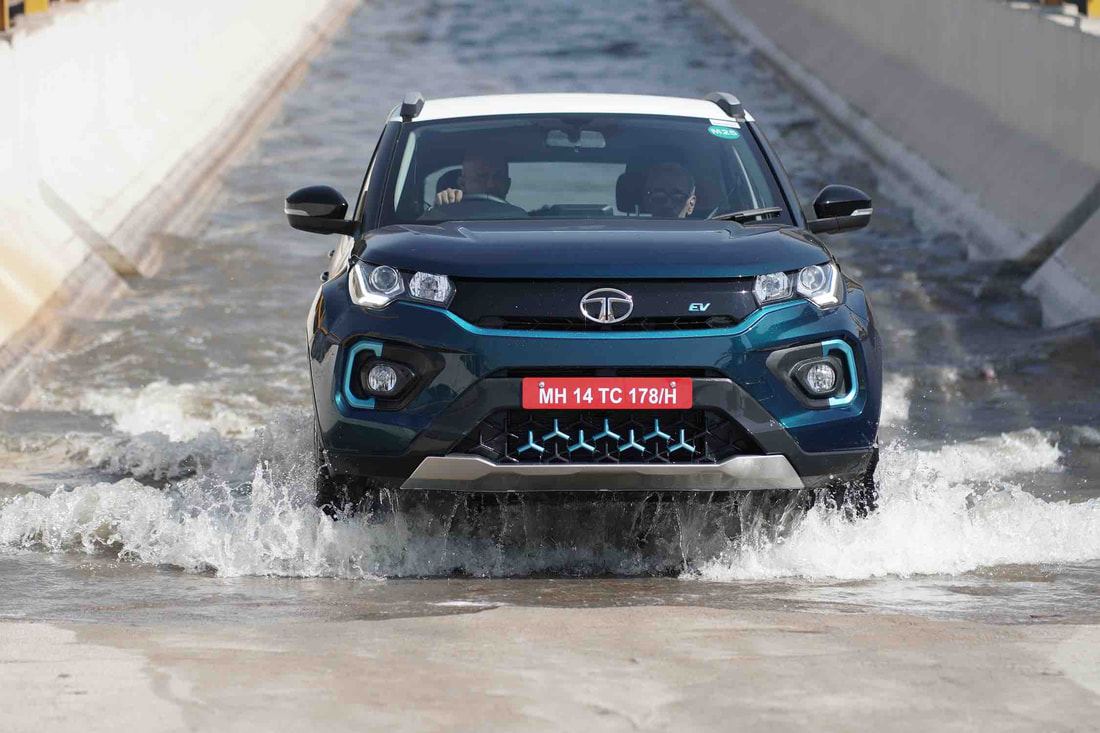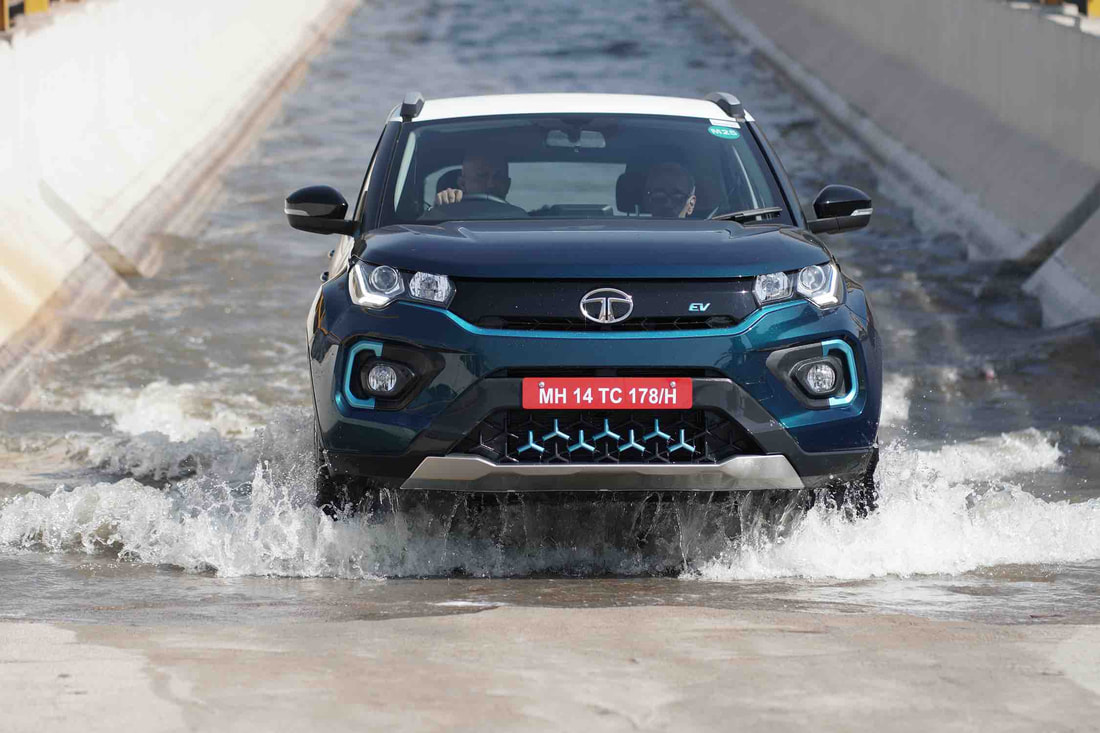Guest Post
by Mr. Anand Kulkarni, Product Line Director
Electric Vehicle & ALFA Architecture - Passenger Vehicle Business Unit, Tata Motors Ltd.
by Mr. Anand Kulkarni, Product Line Director
Electric Vehicle & ALFA Architecture - Passenger Vehicle Business Unit, Tata Motors Ltd.
In the last few years, Electric vehicles are slowly gaining prominence in the automotive sector and it will not be long before they become more established. They have shown the world that they are at-least equitable if not mostly superior in performance to their ICE engine counterparts. Nonetheless, there still seem to be some myths about their capabilities, especially when it comes to their immunity against rainy weather. As the monsoon approaches, the question in everybody’s mind is – Can the Electric vehicle survive the rainy days ahead?
Myth 1: Electric vehicles get damaged in waterlogged areas
Reality:
Electric vehicles have an (Ingress Protection) system. A typical IP rating in an electric vehicle could be IP65 or IP67 rating, depending on the vehicle. Here the digits represent their protection against the two elements - dust and water. Thus, higher the number, better is the protection against these two elements. Modern day Electric vehicle batteries have an IP67 rating. This is quite adequate as anything past IP67 is used generally for specialized equipment such a submarines, etc. An IP67 rating allows you to submerge the vehicle in water up to a meter in height for up to 30 mins without any leakage. Thus, in a situation where the car needs to encounter waterlogging or a flood like situation which is usually about 300 mm wading depth one does not have to worry about damage to the terminals, connectors and high voltage architecture of the vehicle. Additionally, driving an electric car into a pool of water doesn't cause any malfunction, and doesn't conduct electricity into the water are around the vehicle. All systems, inside the battery pack, have multiple layers of protective cutoffs which activate at the first sign of water ingress. The main battery pack also has the ability to isolate itself electrically from the rest of the car.
Myth 2: Electric vehicle are more susceptible to damage in case of lightening
Reality:
Monsoons sometimes come with the untimely occurrences of a thunderstorm. A lot of people worry about the effect that lightening could have on an electric vehicle. However, the truth of the matter is you probably might be safer in a car if lightening were to actually strike the vehicle. The rationale behind this is, that when a bolt of lightning hits a car, it hits the exterior which is a metallic surface. Now, because of the electromagnetic effects on the skin of the vehicle the current would actually pass down safely into the ground. This is known as the Faraday Effect. An NHTSA report also compared exactly the same kind of situation and it reported that electric vehicles are by no means at a higher propensity to their ICE siblings. In fact, they are comparatively lesser prone to any damages in case lightning strikes.
Reality:
Electric vehicles have an (Ingress Protection) system. A typical IP rating in an electric vehicle could be IP65 or IP67 rating, depending on the vehicle. Here the digits represent their protection against the two elements - dust and water. Thus, higher the number, better is the protection against these two elements. Modern day Electric vehicle batteries have an IP67 rating. This is quite adequate as anything past IP67 is used generally for specialized equipment such a submarines, etc. An IP67 rating allows you to submerge the vehicle in water up to a meter in height for up to 30 mins without any leakage. Thus, in a situation where the car needs to encounter waterlogging or a flood like situation which is usually about 300 mm wading depth one does not have to worry about damage to the terminals, connectors and high voltage architecture of the vehicle. Additionally, driving an electric car into a pool of water doesn't cause any malfunction, and doesn't conduct electricity into the water are around the vehicle. All systems, inside the battery pack, have multiple layers of protective cutoffs which activate at the first sign of water ingress. The main battery pack also has the ability to isolate itself electrically from the rest of the car.
Myth 2: Electric vehicle are more susceptible to damage in case of lightening
Reality:
Monsoons sometimes come with the untimely occurrences of a thunderstorm. A lot of people worry about the effect that lightening could have on an electric vehicle. However, the truth of the matter is you probably might be safer in a car if lightening were to actually strike the vehicle. The rationale behind this is, that when a bolt of lightning hits a car, it hits the exterior which is a metallic surface. Now, because of the electromagnetic effects on the skin of the vehicle the current would actually pass down safely into the ground. This is known as the Faraday Effect. An NHTSA report also compared exactly the same kind of situation and it reported that electric vehicles are by no means at a higher propensity to their ICE siblings. In fact, they are comparatively lesser prone to any damages in case lightning strikes.
Myth 3: Charging an Electric vehicle in the rain is dangerous
Reality:
The fear people have about charging an electric vehicle in the rain is because we know that that water conducts electricity. However, fortunately, electric car chargers are weatherproof and are specifically designed to protect both the car and its humans from electrical shock. Electric vehicle chargers are also rigorously tested and have to meet certain standard safety norms. Furthermore, waterproofing electrical connectors as well as any other electric equipment is pretty routine.
Myth 4: Using ancillary components affects range of the electric car
Reality:
An electric vehicle does not eat up a lot of charge when using ancillary components like the air conditioner, lights, etc. Thus, in the monsoon the use of windscreen wipers, defoggers or even head/tail lamps will have no noticeable effect on the range. The electrical consumptions from these ancillaries is already factored in while designing the battery pack. Electric cars have been made and tested to withstand the most adverse conditions and are as competent as their ICE engine siblings. As more and more users experience an electric vehicle the probability of misconceptions and myths surrounding them will decrease.
Reality:
The fear people have about charging an electric vehicle in the rain is because we know that that water conducts electricity. However, fortunately, electric car chargers are weatherproof and are specifically designed to protect both the car and its humans from electrical shock. Electric vehicle chargers are also rigorously tested and have to meet certain standard safety norms. Furthermore, waterproofing electrical connectors as well as any other electric equipment is pretty routine.
Myth 4: Using ancillary components affects range of the electric car
Reality:
An electric vehicle does not eat up a lot of charge when using ancillary components like the air conditioner, lights, etc. Thus, in the monsoon the use of windscreen wipers, defoggers or even head/tail lamps will have no noticeable effect on the range. The electrical consumptions from these ancillaries is already factored in while designing the battery pack. Electric cars have been made and tested to withstand the most adverse conditions and are as competent as their ICE engine siblings. As more and more users experience an electric vehicle the probability of misconceptions and myths surrounding them will decrease.


